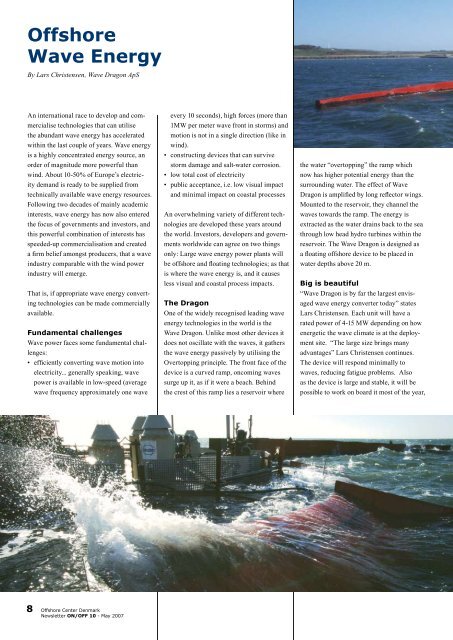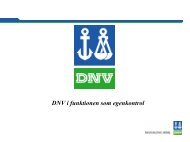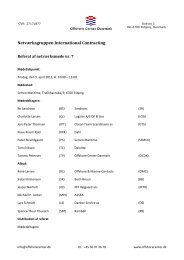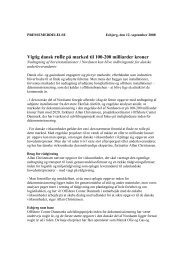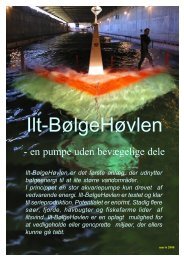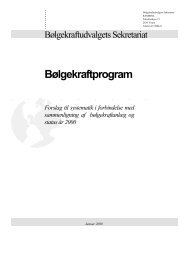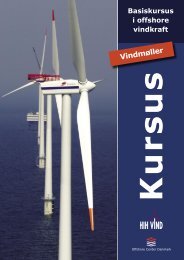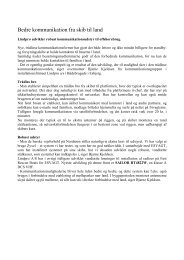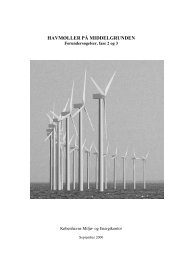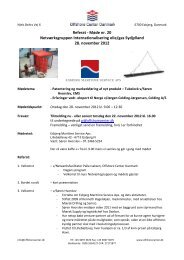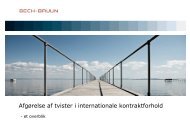Create successful ePaper yourself
Turn your PDF publications into a flip-book with our unique Google optimized e-Paper software.
<strong>Offshore</strong><br />
Wave Energy<br />
By Lars Christensen, Wave Dragon ApS<br />
An international race to develop and commercialise<br />
technologies that can utilise<br />
the abundant wave energy has accelerated<br />
within the last couple of years. Wave energy<br />
is a highly concentrated energy source, an<br />
order of magnitude more powerful than<br />
wind. About 10-50% of Europe’s electricity<br />
demand is ready to be supplied from<br />
technically available wave energy resources.<br />
Following two decades of mainly academic<br />
interests, wave energy has now also entered<br />
the focus of governments and investors, and<br />
this powerful combination of interests has<br />
speeded-up commercialisation and created<br />
a firm belief amongst producers, that a wave<br />
industry comparable with the wind power<br />
industry will emerge.<br />
That is, if appropriate wave energy converting<br />
technologies can be made commercially<br />
available.<br />
Fundamental challenges<br />
Wave power faces some fundamental challenges:<br />
• efficiently converting wave motion into<br />
electricity... generally speaking, wave<br />
power is available in low-speed (average<br />
wave frequency approximately one wave<br />
8<br />
<strong>Offshore</strong> <strong>Center</strong> Denmark<br />
Newsletter <strong>ON</strong>/<strong>OFF</strong> 10 - May 2007<br />
every 10 seconds), high forces (more than<br />
1MW per meter wave front in storms) and<br />
motion is not in a single direction (like in<br />
wind).<br />
• constructing devices that can survive<br />
storm damage and salt-water corrosion.<br />
• low total cost of electricity<br />
• public acceptance, i.e. low visual impact<br />
and minimal impact on coastal processes<br />
An overwhelming variety of different technologies<br />
are developed these years around<br />
the world. Investors, developers and governments<br />
worldwide can agree on two things<br />
only: Large wave energy power plants will<br />
be offshore and floating technologies; as that<br />
is where the wave energy is, and it causes<br />
less visual and coastal process impacts.<br />
The Dragon<br />
One of the widely recognised leading wave<br />
energy technologies in the world is the<br />
Wave Dragon. Unlike most other devices it<br />
does not oscillate with the waves, it gathers<br />
the wave energy passively by utilising the<br />
Overtopping principle. The front face of the<br />
device is a curved ramp, oncoming waves<br />
surge up it, as if it were a beach. Behind<br />
the crest of this ramp lies a reservoir where<br />
the water “overtopping” the ramp which<br />
now has higher potential energy than the<br />
surrounding water. The effect of Wave<br />
Dragon is amplified by long reflector wings.<br />
Mounted to the reservoir, they channel the<br />
waves towards the ramp. The energy is<br />
extracted as the water drains back to the sea<br />
through low head hydro turbines within the<br />
reservoir. The Wave Dragon is designed as<br />
a floating offshore device to be placed in<br />
water depths above 20 m.<br />
Big is beautiful<br />
“Wave Dragon is by far the largest envisaged<br />
wave energy converter today” states<br />
Lars Christensen. Each unit will have a<br />
rated power of 4-15 MW depending on how<br />
energetic the wave climate is at the deployment<br />
site. “The large size brings many<br />
advantages” Lars Christensen continues.<br />
The device will respond minimally to<br />
waves, reducing fatigue problems. Also<br />
as the device is large and stable, it will be<br />
possible to work on board it most of the year,


